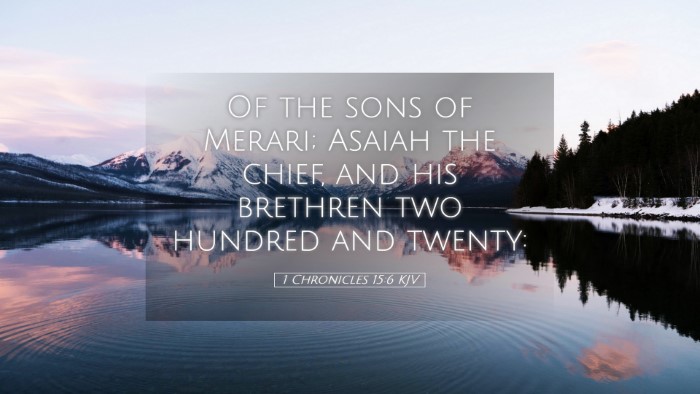Commentary on 1 Chronicles 15:6
Verse: 1 Chronicles 15:6 - "Of the sons of Merari, Asaiah the chief, and his brethren an hundred and twenty."
Introduction
This verse is a part of the historical context surrounding King David’s efforts to bring the Ark of the Covenant into Jerusalem. It highlights the importance of the Merarite family in the service of the Lord through the Levites, and their roles in worship and the care of sacred items.
Contextual Overview
The preceding chapters of 1 Chronicles detail the preparations made for the return of the Ark after it had been in the possession of the Philistines. David is keenly aware that the proper handling and transport of the Ark is essential for maintaining holiness and order in Israel's worship. This verse provides a catalog of families and their leaders within the context of this significant event, emphasizing not just leadership but the collective responsibility assumed by the Levites.
Insights from Public Domain Commentaries
-
Matthew Henry's Commentary:
Matthew Henry reflects on the importance of every individual's role in serving God. He notes that Asaiah, as the chief of the Merarites, carried a significant responsibility in the revival of proper worship, emphasizing the idea that leadership in spiritual matters is a collective endeavor. Each name in the list conveys a message of commitment to God’s service.
-
Albert Barnes' Notes:
Barnes highlights the mention of Merari’s descendants as indicative of the organization within the Levite tribe. He articulates that leadership is central to successful worship and management within the community of faith, offering insights into how David established a structured priesthood to ensure appropriate reverence to God. Asaiah’s involvement signifies both continuity and order, which are essential for sacred functions.
-
Adam Clarke's Commentary:
Adam Clarke emphasizes the genealogical listing as significant in understanding the lineage and heritage of the Levites. He suggests that recognizing the roles of various families underscores God’s design for communal worship. Clarke parallels this passage with New Testament teachings that reaffirm all believers in Christ are priests, hinting at the changing dynamics of leadership within the worship community.
Theological Implications
The passage provides rich theological implications about leadership, service, and community responsibility within the church. Each leader mentioned, including Asaiah, can be seen as a representation of the body of Christ, with individual roles contributing to a greater worship experience. The emphasis on the Merarites shows how each family and individual has a part to play in the sacred task of serving God.
Leadership in Community
The implications of leadership roles in worship settings are profound. It reminds church leaders that their authority must align with the call to service and humility. David’s appointment of these leaders reflects an understanding that God’s presence among His people requires preparation, dedication, and order. This is a timeless principle that resonates in contemporary ecclesiastical structures.
Divine Order and Structure
Furthermore, the importance of structure is evident, suggesting that God operates through organized means. The Levite families were appointed to manage aspects of worship, which signifies that order in worship is a reflection of God’s character. This points to the necessity for churches today to maintain a structured approach to their worship, emphasizing discipline and reverence.
Practical Applications for Today’s Church
-
Recognizing Diverse Roles:
Just as the Merarites played their part in worship, today’s church should recognize and utilize the diverse gifts and roles of its members, ensuring a collaborative effort in ministry.
-
Commitment to Orderly Worship:
Worship should be deliberate and respectful, reflecting the holiness of God. This calls for a commitment to planning and structure within church services.
-
Emphasis on Accountability:
Leadership, like that of Asaiah, carries accountability. Today's leaders must be aware of their responsibility to guide their congregations in faith and righteousness.
Conclusion
1 Chronicles 15:6 serves as a reminder of the essential roles individuals play in the corporate worship of God. Contextualizing this verse helps deepen the understanding of God’s intended order for His people. By examining the contributions of leaders such as Asaiah, we are encouraged to reflect on our roles within the body of Christ, ensuring our service enhances communal worship and exemplifies God’s holiness.


